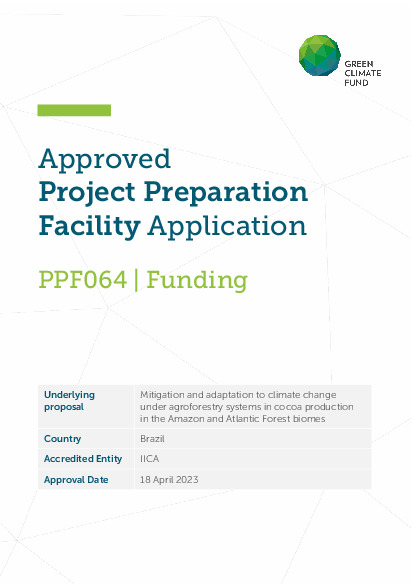Mitigation and adaptation to climate change under agroforestry systems in cocoa production in the Amazon and Atlantic Forest biomes

Mitigation and adaptation to climate change under agroforestry systems in cocoa production in the Amazon and Atlantic Forest biomes
Deforestation is the main source of greenhouse gases (GHG) emissions in Brazil and has increased in recent years. The objective of the project is to reduce and reverse the trend of deforestation and emissions of GHG by agriculture through the recovery of already deforested areas and strengthening the cocoa production systems in priority municipalities of Amazon and Atlantic Forest.
In addition, it is likely that, by 2050, there will be a loss of suitability for cocoa production in the Brazilian Amazon, due to the decrease of precipitation and temperature increase resulting from climate change. In order to avoid the need to expand cocoa production to new areas and prevent a possible reduction in productivity in areas with greater aptitude, it is recommended to adopt agroforestry systems (AFS). Thus, this project aims to achieve this objective by strengthening adaptive capacity to reduce climate vulnerability of ecosystems in cocoa farming communities, reinforcing the national financing, improving the business framework for the development and implementation of AFS with cocoa and strengthening of all the cocoa value chain.
PPF support from GCF is needed to conduct studies to strengthen the general direction of this funding proposal ensuring that the proposed project is consistent with the GCF investment framework.
The PPF will support the following:
- Feasibility study. Which will provide detailed understanding of climate hazard, exposure, and vulnerability of cocoa farmers. The observed trends and projected climate impacts in the intervention area that affects cocoa production will be utilized to compare and assess adaptation options.
- Environmental, Social and Gender Studies. A preliminary ESS assessment (attached in Annex 1 of the CN) conducted by IICA concluded that the project activities would have minimal environmental or social impacts and therefore that an environmental and social impact assessment would not be required. However, a Gender Action Plan and stakeholder analysis, including an indigenous peoples safeguard and the grievance mechanism, will be required as part of this PPF.
- Identification of programme/project level indicators. Which will provide the Logical framework, including project, baselines and targets, indicators, the assessment of the project against GCF investment criteria and a budgeted monitoring and evaluation plan.
- Project Design. With the detailed supporting studies related to cocoa value chain implemented for the project components, it will be possible to specify the future focus and content of the project and the final output of the PPF will be: (i) the design of the logical framework of project results and components; (ii) the theory of change; (iii) a detailed financing plan and budget by project expected result, (iv) institutional and implementation arrangements and (v) a procurement and contracting plan with respective costs. All these are essential elements to develop the complete Funding Proposal.
In developing the above, a broad-based and comprehensive consultation process with detailed participatory discussion sessions will be held with producer associations, civil society organization, government authorities, and private sector participants such as cocoa processing and chocolate industries and financial institutions, among others.
In this way, the PPF will have a more closely analyse to ensure that the project's incremental thinking, cost-effectiveness, risks and mitigation issues, the anticipated impact of climate change (and non-climatic drivers) in each of the target communities, number and nature of final direct and indirect beneficiaries are addressed and the implementation arrangements agreed with Operational Partners (OP) and Government counterparts This process will lead to the establishment of a strong and effective partnership that can ensure the achievement of positive project results and transformational impact.